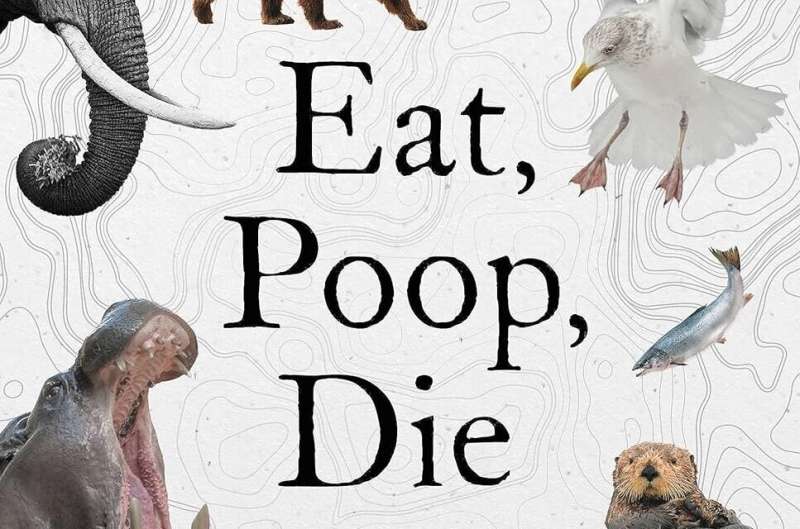This article has been reviewed according to Science X's editorial process and policies. Editors have highlighted the following attributes while ensuring the content's credibility:
fact-checked
trusted source
proofread
'Eat, Poop, Die': Researcher's book explores how animals make our world

In his new book "Eat, Poop, Die," UVM wildlife expert Joe Roman explores the fascinating lives of whales, seabirds, insects and other animals as they traverse their homes, from a few thousand kilometers of ocean to a few inches of soil.
Roman's book reveals that, in carrying out their most basic life functions, animals play a crucial role in moving nutrients around the planet—and they're sustaining life as we know it along the way.
Roman, a Fellow and Writer-In-Residence at the Gund Institute, will host a public book launch on Nov. 29. He explains how standing aboard a boat deck and watching a whale poop inspired a new argument for protecting Earth's species.
How did you get the idea for this book, and its name?
Over 20 years, ago, I was studying critically endangered North Atlantic right whales in the Gulf of Maine, and one of the first times I was on the water, a large male with mud on its head, indicating it had been feeding on the ocean floor, lifted its fluke and released this enormous fecal plume—yes, whale dung—that was almost as big as the boat.
A few years later, I learned about the biological pump. Marine ecologists have typically focused on phytoplankton—microscopic algae—that utilize nutrients at the ocean's surface. When they die, they can remove—or pump—carbon and other nutrients from the surface when they sink into the deep ocean or seafloor. I thought back to my days following whales, and I realized they might be doing something entirely different: perhaps whales were actually pumping these nutrients back up to the surface.
So I went out with a net and collected whale poop, and we found it contained high levels of elements like nitrogen and phosphorus, which are essential to phytoplankton and other organisms. And if we add up the nutrients surfaced by right whales, humpbacks, and other cetaceans in the Gulf, they introduce more nutrients than all the rivers of the Gulf of Maine combined. It was a whale pump—a process that we've now explored from Alaska to Iceland. Their impact used to be much larger, before commercial whaling depleted many species.
Whales also have a big impact when they die and sink to the deep sea—a whale fall. Scientists have found hundreds of species feeding and living on the bodies of whales, many entirely dependent on these whale falls. A few years ago, I realized that my research was looking at whales eating, pooping and dying. So I made a slide for a presentation that read "eat, poop, die," and I said that should be the title of my next book.
Why are these processes important ecologically?
We often think of plants as the lungs of the planet, absorbing carbon dioxide and releasing oxygen. We can think of animals as the circulatory system. They can move nutrients up and down in the ocean or the forests—or across thousands of miles when they migrate.
Seabirds are a great example. The Icelandic island of Surtsey formed from a volcanic eruption in 1963. Scientists have since been observing its transformation from bare lava to grasslands. At first, few plants survived; there wasn't enough nitrogen. But then seabirds started nesting. Seabirds consume fish or krill, then poop on the land around the nests. Their guano is very rich in nitrogen and phosphorus. After they started nesting, a large grassland formed—you can see it from space.
Other studies show that tropical islands with higher bird abundance, and more poop, have more parrotfish, which eat dead corals, grind it into sand, and poop it out along the coastline. The next time you're sitting on a tropical beach, it's worth thinking about the processes that made all those beautifully colored grains of sand.
OK, but most of us don't live on a remote island surrounded by sand and seabirds. Why should we care?
We now know that whales play a foundational role in redistributing nutrients vital to ocean ecosystems. This research has helped to inform policy, including new conservation efforts in the International Whaling Commission. Laws to protect these animals work. I grew up in New York City and never saw a whale growing up.
Now when I go back to visit my mom, there are humpbacks and fin whales off the coast of Brooklyn, Queens, and Long Island. The waters are much cleaner than they were 30, 40 years ago. That isn't by accident. These changes occurred because of laws like the Endangered Species Act, the Marine Mammal Protection Act, and the Clean Water Act.
The ecological processes I share in this book don't only happen in remote areas; they also occur in our backyards. Birds and squirrels can carry seeds and move nutrients just like they do on remote islands. It's just that we've removed many of the large animals from the landscape. My dream is that at some point, talking about animals will be like talking about the weather. Instead of starting a conversation about the weather, I want to hear: "Oh, look at this large flock of birds that flew overhead," or "The beavers are back at the dam again." I hope we can restore animals to a central place in our culture.
Provided by University of Vermont


















